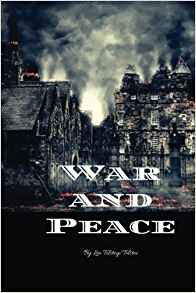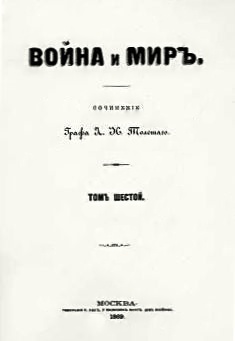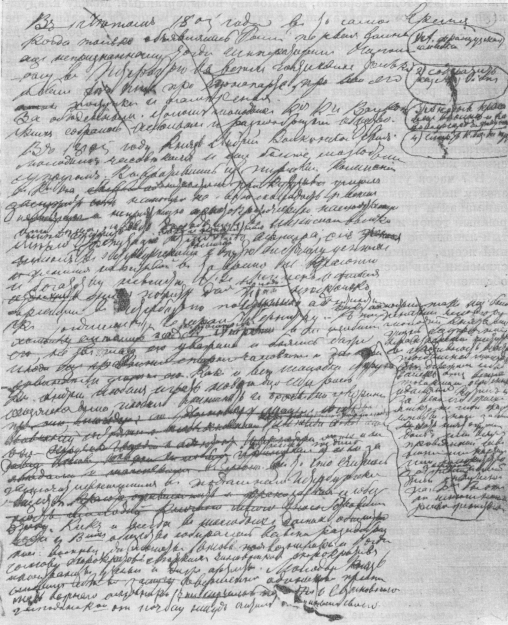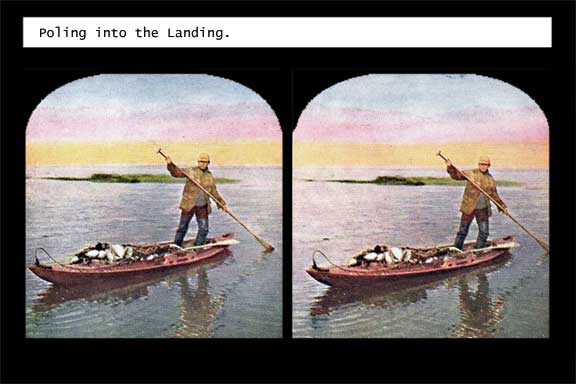War and Peace: TL;DR
- Wednesday, February 06 2019 @ 12:04 pm EST
- Contributed by: masodo
- Views: 2,822

 Few folks would argue that to commit oneself to reading a 12~1500 page novel is a daunting assignment, to say the least. This is however, something I have intended to do and something I am pleased to say I have finally accomplished.
Few folks would argue that to commit oneself to reading a 12~1500 page novel is a daunting assignment, to say the least. This is however, something I have intended to do and something I am pleased to say I have finally accomplished.
 In the interest of full disclosure: Rather than curl up in some well-lit nook to pour over this monumental tome in hardcover form, I chose rather, to listen to the "Golden Voice" of David Fredrick Case (a.k.a. Fredrick Davidson) read Leo Tolstoy's - "War and Peace" aloud to me - via the Blackstone AudioBook - on my daily commute. At nearly 60 hours of playing time this too proved to be a serious commitment to task.
In the interest of full disclosure: Rather than curl up in some well-lit nook to pour over this monumental tome in hardcover form, I chose rather, to listen to the "Golden Voice" of David Fredrick Case (a.k.a. Fredrick Davidson) read Leo Tolstoy's - "War and Peace" aloud to me - via the Blackstone AudioBook - on my daily commute. At nearly 60 hours of playing time this too proved to be a serious commitment to task.
A brief synopsis of this Leo Tolstoy masterpiece follows:
Napoleon’s invasion of Russia in 1812 and follows three of the most well-known characters in literature: Pierre Bezukhov, the illegitimate son of a count who is fighting for his inheritance and yearning for spiritual fulfillment; Prince Andrei Bolkonsky, who leaves his family behind to fight in the war against Napoleon; and Natasha Rostov, the beautiful young daughter of a nobleman who intrigues both men.[Amazon]
All-in-all I must say, this was a very rewarding exercize and well worth the effort. The book is in the public domain and is available to read on-line if you are feeling adventurous. LibraVox also has available AudioBook versions if you wish to have the story read aloud to you, thanks to community volunteers.

Tolstoy's notes from the ninth draft of War and Peace, 1864.
Many people will ponder tackeling a reading of this - currently rated, "ninth longest" - book and will quickly decide on any of several thousand other things with which to while away the hours. If you are one of those who, after picking up the book - finding it simply too arduous - fliped to the back of the book, you have been unwittingly blessed with a fine bit of philosophical verbiage from the brilliant mind of Leo Tolstoy; a bit of wisdom that has long been the reward to those who travel through the narative on the authors intended path. If you go through life having never read War and Peace I suggest you at least examine the following, closing chapter. Rather than a "spoiler" you are most likely to find the encouragement to discover how Tolstoy masterfully laid the foundational context for this rather mind-bending look at reality versus history:
WAR AND PEACE by Leo Tolstoy
Second EpilogueCHAPTER XII
From the time the law of Copernicus was discovered and proved, the mere recognition of the fact that it was not the sun but the earth that moves sufficed to destroy the whole cosmography of the ancients. By disproving that law it might have been possible to retain the old conception of the movements of the bodies, but without disproving it, it would seem impossible to continue studying the Ptolemaic worlds. But even after the discovery of the law of Copernicus the Ptolemaic worlds were still studied for a long time.
From the time the first person said and proved that the number of births or of crimes is subject to mathematical laws, and that this or that mode of government is determined by certain geographical and economic conditions, and that certain relations of population to soil produce migrations of peoples, the foundations on which history had been built were destroyed in their essence.
By refuting these new laws the former view of history might have been retained; but without refuting them it would seem impossible to continue studying historic events as the results of man's free will. For if a certain mode of government was established or certain migrations of peoples took place in consequence of such and such geographic, ethnographic, or economic conditions, then the free will of those individuals who appear to us to have established that mode of government or occasioned the migrations can no longer be regarded as the cause.
And yet the former history continues to be studied side by side with the laws of statistics, geography, political economy, comparative philology, and geology, which directly contradict its assumptions.
The struggle between the old views and the new was long and stubbornly fought out in physical philosophy. Theology stood on guard for the old views and accused the new of violating revelation. But when truth conquered, theology established itself just as firmly on the new foundation.
Just as prolonged and stubborn is the struggle now proceeding between the old and the new conception of history, and theology in the same way stands on guard for the old view, and accuses the new view of subverting revelation.
In the one case as in the other, on both sides the struggle provokes passion and stifles truth. On the one hand there is fear and regret for the loss of the whole edifice constructed through the ages, on the other is the passion for destruction.
To the men who fought against the rising truths of physical philosophy, it seemed that if they admitted that truth it would destroy faith in God, in the creation of the firmament, and in the miracle of Joshua the son of Nun. To the defenders of the laws of Copernicus and Newton, to Voltaire for example, it seemed that the laws of astronomy destroyed religion, and he utilized the law of gravitation as a weapon against religion.
Just so it now seems as if we have only to admit the law of inevitability, to destroy the conception of the soul, of good and evil, and all the institutions of state and church that have been built up on those conceptions.
So too, like Voltaire in his time, uninvited defenders of the law of inevitability today use that law as a weapon against religion, though the law of inevitability in history, like the law of Copernicus in astronomy, far from destroying, even strengthens the foundation on which the institutions of state and church are erected.
As in the question of astronomy then, so in the question of history now, the whole difference of opinion is based on the recognition or nonrecognition of something absolute, serving as the measure of visible phenomena. In astronomy it was the immovability of the earth, in history it is the independence of personality- free will.
As with astronomy the difficulty of recognizing the motion of the earth lay in abandoning the immediate sensation of the earth's fixity and of the motion of the planets, so in history the difficulty of recognizing the subjection of personality to the laws of space, time, and cause lies in renouncing the direct feeling of the independence of one's own personality. But as in astronomy the new view said: "It is true that we do not feel the movement of the earth, but by admitting its immobility we arrive at absurdity, while by admitting its motion (which we do not feel) we arrive at laws," so also in history the new view says: "It is true that we are not conscious of our dependence, but by admitting our free will we arrive at absurdity, while by admitting our dependence on the external world, on time, and on cause, we arrive at laws."
In the first case it was necessary to renounce the consciousness of an unreal immobility in space and to recognize a motion we did not feel; in the present case it is similarly necessary to renounce a freedom that does not exist, and to recognize a dependence of which we are not conscious.
~~~~~ THE END ~~~~~
tag:historic pub_dom educational read listen musing living]

















































 Them All!
Them All!

